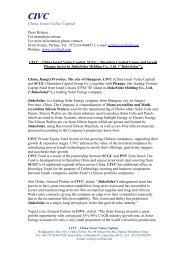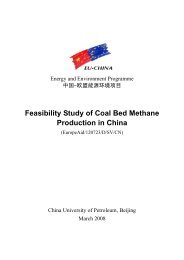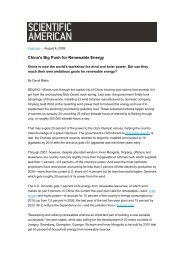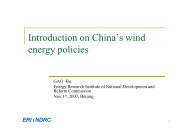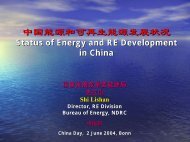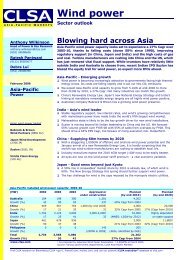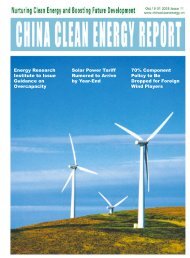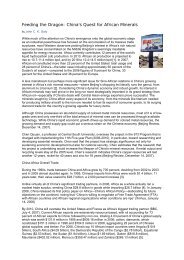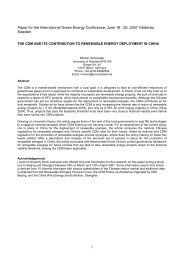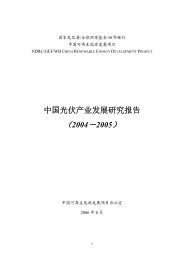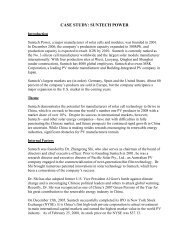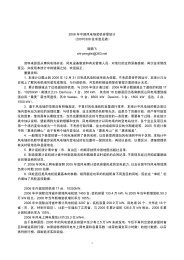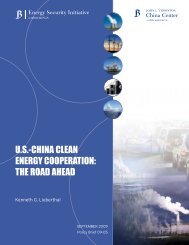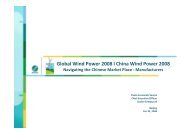LDK Solar Co., Ltd. - Asia Europe Clean Energy (Solar) Advisory Co ...
LDK Solar Co., Ltd. - Asia Europe Clean Energy (Solar) Advisory Co ...
LDK Solar Co., Ltd. - Asia Europe Clean Energy (Solar) Advisory Co ...
You also want an ePaper? Increase the reach of your titles
YUMPU automatically turns print PDFs into web optimized ePapers that Google loves.
increase. See ""Risk Factors Ì Risks Relating to Business Operations in China Ì Expiration of, or changes to,<br />
current PRC tax incentives that our business enjoys could have a material adverse effect on our results of<br />
operations'' in this prospectus.<br />
In March 2007, the National People's <strong>Co</strong>ngress of China enacted a new Enterprise Income Tax Law,<br />
which will become effective on January 1, 2008. The new tax law would impose a unified income tax rate of<br />
25% on all domestic enterprises and foreign-invested enterprises unless they qualify under certain limited<br />
exceptions. The new tax law permits companies to continue to enjoy their existing preferential tax treatment<br />
until such treatment expires in accordance with its current terms. Under the new tax law, ""high and new<br />
technology enterprises'' specially supported by the PRC government will continue to enjoy a reduced national<br />
enterprise tax rate of 15%. The new tax law, however, does not specify what high and new technology<br />
enterprises will be eligible for special support from the government. Our wholly owned subsidiary, Jiangxi<br />
<strong>LDK</strong> <strong>Solar</strong>, obtained the ""high and new technology enterprise'' status in December 2006. Such status is valid<br />
for two years and is renewable upon review and approval by the Science and Technology Bureau of Jiangxi<br />
Province. If we fail to maintain our status as a ""high and new technology enterprise'' or fail to qualify for<br />
special support from the PRC government, we will be subject to the 25% unified enterprise income tax rate<br />
beginning in 2011 after our current preferential tax treatment expires.<br />
Under the current PRC tax law, dividend payments to foreign investors made by foreign-invested<br />
enterprises such as our PRC subsidiary, Jiangxi <strong>LDK</strong> <strong>Solar</strong>, are exempt from PRC withholding tax. Pursuant<br />
to the new tax law, however, dividends payable by a foreign-invested enterprise to its foreign investors will be<br />
subject to a 20% withholding tax, unless any such foreign investor's jurisdiction of incorporation has a tax<br />
treaty with China that provides for a different withholding arrangement. The Cayman Islands, where we are<br />
incorporated, does not have such a tax treaty with China. Although the new tax law contemplates the<br />
possibility of exemptions from withholding taxes for China-sourced income of foreign-invested enterprises, the<br />
PRC tax authorities have not promulgated any related implementation rules and it remains unclear whether<br />
we would be able to obtain exemptions from PRC withholding taxes. In addition, under the new tax law,<br />
enterprises organized under the laws of jurisdictions outside China with their ""de facto management bodies''<br />
located within China may be considered PRC resident enterprises and therefore subject to PRC enterprise<br />
income tax at the rate of 25% on their worldwide income. The new tax law, however, does not define the term<br />
""de facto management bodies.'' If a majority of the members of our management team continue to be located<br />
in China after the effective date of the new tax law, we may be considered a PRC resident enterprise and<br />
therefore subject to PRC enterprise income tax at the rate of 25% on our worldwide income.<br />
We recognize deferred tax assets and liabilities for temporary differences between financial statement and<br />
income tax bases of assets and liabilities. Valuation allowances are provided against the carrying amount of our<br />
deferred tax assets on our financial statements when our management cannot conclude that it is more likely<br />
than not that some portion or all of the deferred tax asset will be realized.<br />
Critical Accounting Policies<br />
We prepare our consolidated financial statements in accordance with U.S. GAAP, which requires us to<br />
make judgments, estimates and assumptions that affect:<br />
‚ the reported amounts of our assets and liabilities;<br />
‚ the disclosure of our contingent assets and liabilities at the end of each reporting period; and<br />
‚ the reported amounts of revenues and expenses during each reporting period.<br />
We continually evaluate these estimates based on our own experience, knowledge and assessment of<br />
current business and other conditions, our expectations regarding the future based on available information<br />
and reasonable assumptions, which together form our basis for making judgments about matters that are not<br />
readily apparent from other sources. Since the use of estimates is an integral component of the financial<br />
reporting process, our actual results could differ from those estimates. Some of our accounting policies require<br />
a higher degree of judgment than others in their application. When reading our consolidated financial<br />
statements, you should consider:<br />
‚ our selection of critical accounting policies;<br />
‚ the judgment and other uncertainties affecting the application of such policies; and<br />
48



